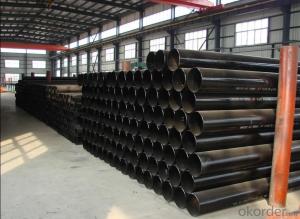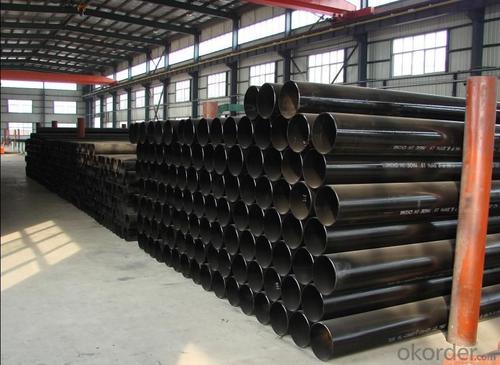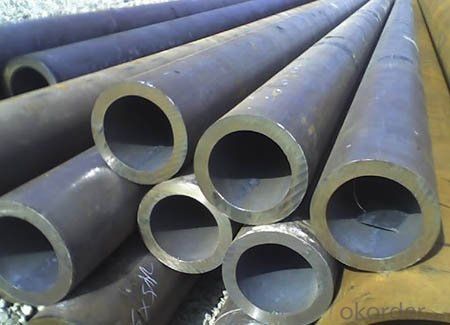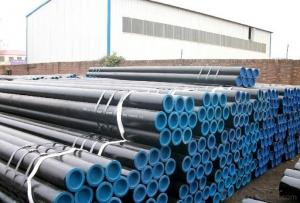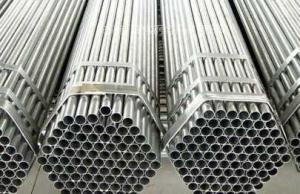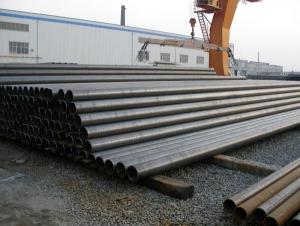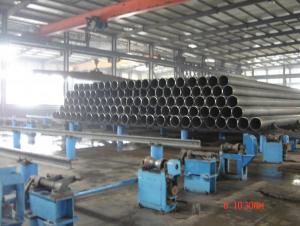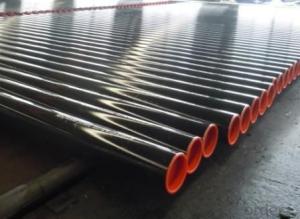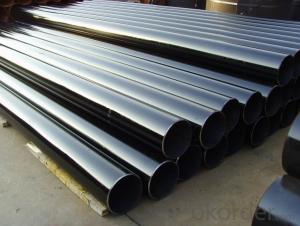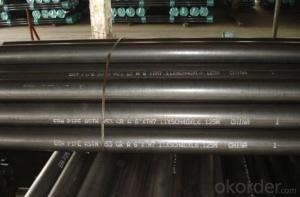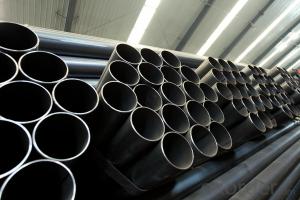API 5L ERW LINE PIPE
- Loading Port:
- China Main Port
- Payment Terms:
- TT or LC
- Min Order Qty:
- -
- Supply Capability:
- -
OKorder Service Pledge
OKorder Financial Service
You Might Also Like
1、Structure of Welded Steel Tube:
Welded Steel Tube is formed by drawing a solid billet over a piercing rod to create the hollow shell. We will provide you high quality of welded pipe and professioanl service.
2、Main Features of the Welded Steel Tube:
• High manufacturing accuracy
• The higher strength
• The small inertia resistance
• Strong heat dissipation ability
• Good visual effect
• Satisfy price
3、Welded Steel Tube Specification:
Standard | GB, DIN, ASTM ASTM A106-2006, ASTM A53-2007 |
Grade | 10#-45#, 16Mn 10#, 20#, 45#, 16Mn |
Thickness | 8 - 33 mm |
Section Shape | Round |
Outer Diameter | 133 - 219 mm |
Place of Origin | Shandong, China (Mainland) |
Secondary Or Not | Non-secondary |
Application | Hydraulic Pipe |
Technique | Cold Drawn |
Certification | API |
Surface Treatment | factory state or painted black |
Special Pipe | API Pipe |
Alloy Or Not | Non-alloy |
Length | 5-12M |
Outer Diameter | 21.3-610mm |
Grade | 20#, 45#, Q345, API J55, API K55, API L80, API N80, API P110, A53B |
Standard | ASME, ASTM |
1) Material:20#(ASTM A 106/A53 GRB.API5LGRB,GB),45#,16Mn,10#.
2) Specification range:OD:21.3-610mm,WT:6-70mm,length:6-12m or according to the requirement of clients.
3) Excutive standards:GB,ASME API5L.ASTM A 106/A53,Despite of the above standards,we can also supply seamless steel pipe with standard of DIN,JIS,and so on,and also develop new products according to the requirements of our clients!
4) Surface:black lacquered,varnish coating or galvanized.
5) Ends:Beveled or square cut,plastic capped,painted.
6) Packing:bundles wrapped with strong steel strip,seaworthy packing.
4、Packaging & Delivery
Packaging Details: | seaworthy package,bundles wrapped with strong steel strip |
Delivery Detail: | 15-30days after received 30%TT |
5、FAQ of Welded Steel Tube:
①How is the quality of your products?
Our products are strictly in accordance with international and domestic standard. We test on every pipe before delivery. We promise 100% refund if our products are not the same with our description. Any quality certification or testing report you want to see, please tell us.
②How about the price?
Yes, we are offering you the lowest price since we are factory. If you are interested in bargain, just don’t waste your time. Our quotation is professional.
③Why should you choose us?
We can also offer professional products inquiry, products knowledge train (for agents), fast goods delivery, outstanding customer solution proposals. Our service formula: good quality + good price + good service=customer’s trust.
SGS test is available. Customer inspection before shipping is welcome. Third party inspection is OK.
6、 Welded Steel Tube Images:
- Q: How does the price of steel pipes vary based on size and grade?
- The price of steel pipes can vary based on their size and grade. Generally, larger pipes tend to have higher prices due to the increased amount of raw materials required for their production. Additionally, pipes with higher-grade steel, which offers better strength and durability, often come at a higher cost compared to lower-grade options. The size and grade of steel pipes are important factors to consider when determining their price in the market.
- Q: How do you calculate the bending moment of a steel pipe?
- To calculate the bending moment of a steel pipe, you need to consider both the applied load and the structural properties of the pipe. The bending moment is a measure of the internal forces within the pipe caused by the applied load. The bending moment can be calculated using the following equation: Bending Moment = Load x Distance Here, the load represents the external force acting on the pipe, and the distance is the distance from the point where the load is applied to the point where the bending moment is being calculated. In order to accurately calculate the bending moment, you must also consider the properties of the steel pipe. This includes the pipe's cross-sectional area, second moment of area (also known as the moment of inertia), and the modulus of elasticity. The second moment of area reflects the pipe's resistance to bending and can be calculated based on the dimensions of the pipe's cross-section. The modulus of elasticity represents the pipe's stiffness and can be obtained from material properties data. Once you have determined the load, distance, cross-sectional area, moment of inertia, and modulus of elasticity, you can plug these values into the bending moment equation to calculate the bending moment for the steel pipe. It is important to note that the calculation of bending moment assumes linear elastic behavior, which means that the pipe does not exceed its elastic limit and does not undergo plastic deformation. If the pipe is subjected to loads that exceed its capacity, the calculation of bending moment may not accurately represent the actual behavior of the pipe. In such cases, it is advisable to consult with a structural engineer or use more sophisticated analysis methods to accurately assess the bending moment.
- Q: Can steel pipes be used for heating and cooling systems?
- Yes, steel pipes can be used for heating and cooling systems. Steel pipes are commonly used in HVAC (heating, ventilation, and air conditioning) systems as they have excellent heat transfer properties, durability, and can withstand high-pressure conditions. Additionally, steel pipes are resistant to corrosion, making them suitable for both heating and cooling applications.
- Q: What are the different types of coatings used for steel pipes?
- There are several types of coatings commonly used for steel pipes, including epoxy coatings, polyethylene coatings, zinc coatings, and coal tar coatings. Each type of coating offers unique benefits and is used for specific applications to protect the steel pipes from corrosion and other forms of damage.
- Q: How are steel pipes used in the construction of dams?
- Steel pipes are used in the construction of dams for various purposes such as water intake/outlet systems, penstocks, and spillway gates. These pipes are essential for transporting water to and from the dam, controlling the flow, and ensuring the dam's stability.
- Q: How are steel pipes used in the telecommunications industry?
- Steel pipes are used in the telecommunications industry primarily for the installation and protection of underground fiber optic cables. These pipes provide a sturdy and durable infrastructure for the cables, ensuring their safety from external factors such as weather conditions or accidental damage. Additionally, steel pipes are also used for the construction of telecommunication towers, providing the necessary strength and support for antennas and other equipment.
- Q: Are steel pipes suitable for use in acidic environments?
- Yes, steel pipes are generally suitable for use in acidic environments. However, the specific grade of steel and the concentration of the acid should be considered to ensure proper corrosion resistance. Coating or lining the pipes with materials such as epoxy or rubber can also enhance their resistance to acidic conditions.
- Q: How are steel pipes transported?
- Steel pipes can be transported using various methods depending on their size, weight, and distance to be covered. The most common modes of transportation for steel pipes include trucks, trains, and ships. For short distances, steel pipes are often transported using trucks. They are loaded onto flatbed trailers or in some cases, specialized pipe trailers that are specifically designed to securely hold and transport pipes. These trucks can easily navigate local roads and highways, making them a convenient option for transporting steel pipes to nearby locations or construction sites. When it comes to long-distance transportation, trains are commonly used. Steel pipes are loaded onto flatcars, which are specifically designed to carry heavy loads. This method is preferred when transporting large quantities of steel pipes over long distances, as trains provide a cost-effective and efficient means of transportation. Moreover, trains are capable of transporting pipes of various lengths and diameters, making them a versatile option. For international shipments or transportation over bodies of water, steel pipes are often transported by ships. Steel pipes can be loaded into shipping containers or onto the deck of a cargo ship. Shipping containers provide protection from weather conditions and ensure the pipes remain secure during transit. Additionally, specialized ships equipped with cranes can handle large and heavy pipes, facilitating the transportation of oversized steel pipes. In some cases, pipelines can also be constructed to transport steel pipes directly from the manufacturing facility to the desired location. This method is commonly used for projects involving oil, gas, or water pipelines. The pipes are laid underground, eliminating the need for separate transportation. Overall, the transportation of steel pipes involves a variety of methods, including trucks, trains, ships, and pipelines, depending on the distance, quantity, and specific requirements of the project. Each method has its advantages and is chosen based on factors such as cost, efficiency, and logistics.
- Q: What is the difference between steel pipes and fiberglass pipes?
- Steel pipes and fiberglass pipes differ in their material composition and properties. Steel pipes are made of iron and carbon alloy, making them strong and durable. They are suitable for high-pressure applications and can withstand extreme temperatures. In contrast, fiberglass pipes are composed of glass fibers embedded in a resin matrix. They are lightweight, corrosion-resistant, and have excellent thermal insulation properties. Fiberglass pipes are commonly used in industries where corrosion or chemical resistance is required, and they are also more cost-effective for certain applications.
- Q: How are steel pipes repaired in case of damage?
- Steel pipes are repaired in case of damage through various methods such as welding, patching, or replacing the damaged section. The appropriate repair technique depends on the type and extent of the damage to ensure the structural integrity and functionality of the pipe.
Send your message to us
API 5L ERW LINE PIPE
- Loading Port:
- China Main Port
- Payment Terms:
- TT or LC
- Min Order Qty:
- -
- Supply Capability:
- -
OKorder Service Pledge
OKorder Financial Service
Similar products
Hot products
Hot Searches
Related keywords
